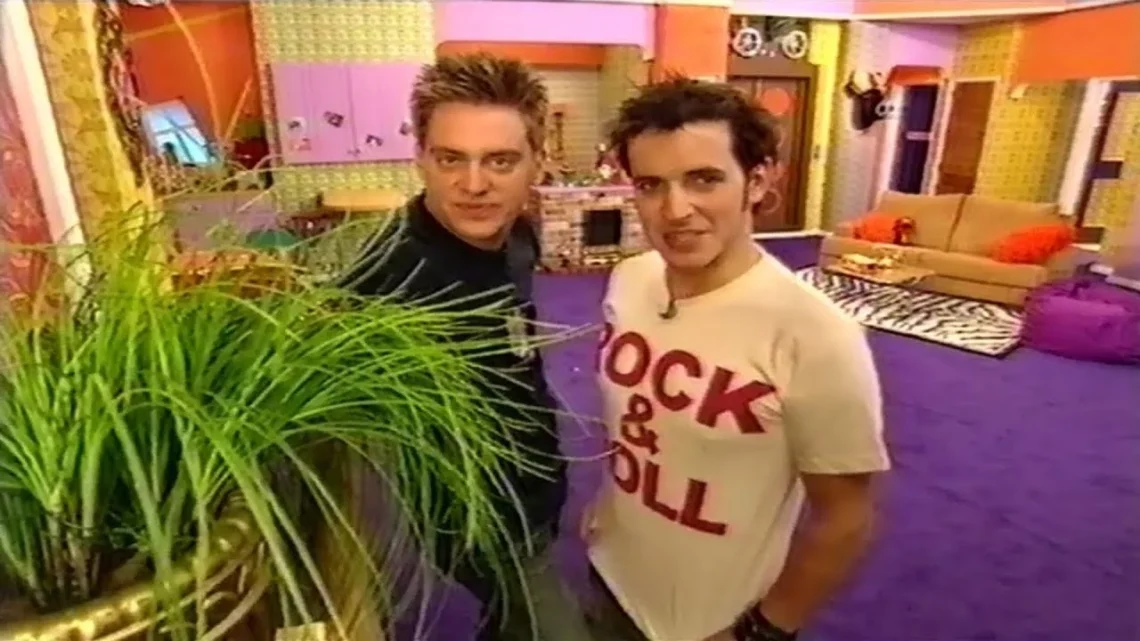What Was Dick & Dom in da Bungalow?
Dik and Dom in da Bungalow: Dick & Dom in da Bungalow was a British children’s television show that ran from 2002 to 2006, presented by the comedy duo Dick (Richard McCourt) and Dom (Dominic Wood). It aired on weekend mornings on CBBC, and later also on BBC One and BBC Two.
The show’s format combined live sketches, messy games, audience involvement, and contests. Contestants (called “Bungalow Heads”) competed for “Bungalow Points”, which carried over across the two days (Saturday and Sunday). At the end of Sunday, the Bungalow Head with the most points was crowned King or Queen of the Bungalow and awarded prizes
The show became notable for its chaotic energy, audience participation, and gross or messy stunts, making it a memorable staple of early 2000s UK children’s TV.
The Format & Signature Features
One of the main draws of Dick & Dom in da Bungalow was its unpredictable format and signature segments.
Games & Messy Challenges
The show featured a wide array of silly, messy games, many involving gunge, custard, slime, and wetness. These stunts often pushed the boundaries of what might be allowed on children’s TV, adding a kind of anarchic fun. For example, one of the memorable games was a cereal race, where contestants had to eat a bowl of cereal under time pressure.
Show Structure & Point System
Six Bungalow Heads competed simultaneously. Over both days (Saturday & Sunday), they earned Bungalow Points via various segments and mini-games. Points carried through from Saturday to Sunday. The lowest-point contestant often got a comedic “punishment” (like being gunged), while mid-rank contestants might receive joke prizes.
Recurring Characters & Sketches
Alongside the games, the show featured quirky characters and running sketches. One notable recurring character was “Harry Batt”, a kind of disciplinarian who showed up in later seasons to impose order or punish broken rules. The show also introduced spin-off sketches, parodies, and interludes that contributed to its chaotic charm.
Live & Interactive Nature
Much of the show was broadcast live or semi-live, which gave it an unpredictable, spontaneous edge. Viewers could see things go slightly off script or messy in real time. Because of that live element, the show had an energetic, risky feel unlike pre-recorded children’s programming.
The Legacy & Cultural Impact
Although Dick & Dom in da Bungalow ended in 2006, its influence and memory endure.
Cult Following & Nostalgia
For many who grew up in the 2000s in the UK, Dick & Dom in da Bungalow remains a nostalgic touchstone. Fans regularly reminisce about their favorite messy games, absurd prizes, and unpredictable chaos. Posts on forums and social media often ask where to stream archived episodes.
Spin-Offs & Repeats
After its original run, the show gave rise to compilation and spin-off series. One notable one is Da Dick and Dom Dairies (pronounced “Diaries”) which aired in 2009. It repackaged memorable moments plus newly recorded interstitial material. Other related content includes Diddy TV and retrospective features.
Live Tour Revival
In recent years, the creators announced a live tour to celebrate the show’s legacy. The tour, titled Dick & Dom in da Bungalow – Live Show, began in March 2023, and fans were invited to reexperience games and chaos in person. The staged performance aimed to evoke the spirit of the original show – messy, fun, and interactive.
Set as a Pub?
More recently, Dick and Dom floated a quirky idea: converting the original bungalow set into a themed pub. The idea, backed by fan enthusiasm, would transform pieces of set design into a nostalgic entertainment space.
Through these continuations, Dick & Dom in da Bungalow remains more than a relic — it’s still active in fan memory, entertainment spaces, and cultural references.
Behind the Scenes: Creators & Production
Understanding the creators and how the show was made adds depth to its story.
Dick & Dom: The Duo
Richard McCourt (“Dick”) and Dominic Wood (“Dom”) first became familiar to UK children while presenting CBBC continuity links (i.e. the in-between show segments).Their chemistry and comedic style led to the development of their own flagship show. Over many years, Dick & Dom have worked in children’s TV, theater, radio, and live events.
Production & Naming
The title in da Bungalow was suggested by the BBC as a playful parody or twist referencing Ali G Indahouse (playing on “in the house”). The bungalow setting provided a loose “home” for the show’s chaos: the hosts, contestants, props, and games all took place in or around this fictional “Bungalow.”
Filming & Broadcast Logistics
The show was produced at BBC Television Centre, with live segments, pre-prepped game props, studio audience involvement, and real-time risk. In its early seasons, episodes were up to 180 minutes long; later seasons trimmed to around 120 minutes per show. Because of the live play, segments sometimes deviated, making each show feel fresh and unpredictable.
Regulatory and Controversy Issues
Due to its boundary-pushing style, the show ran into regulatory complaints. For example, in 2004 the BBC upheld a complaint about near-naked promotional images featuring Dom and Dick. In another instance, an episode segment had Dom wearing a T-shirt with the phrasing “Morning Wood” (a slang double entendre), which drew censure from Ofcom for breaching children’s programming rules.
Personal Stories: Contestants & Fan Perspectives
One of the strengths of Dick & Dom in da Bungalow was how it engaged with real children and viewers — and how participants remember their time on it.
Contestants’ Experience
In interviews, former contestants have recounted memories of auditioning, excitement, and messiness. VICE One former participant recalls being scouted while doing a Scouts activity, then flown to London for filming. VICE Others mention surprise games (e.g. wearing giant clown trousers or being “interrogated” live) and the adrenaline of competition under studio lights.
Some producers apparently scouted contestants in schools or public events to build a pool of children who could compete authentically.
Fan Memory & Online Discussion
On forums and social media, fans often reminisce about their favorite episodes, games, and the sense of chaos and unpredictability. Many express longing for the show’s return or archived episode access.
Some fans have speculated on potential reunions or revivals, and happily supported ideas like the live tour or converting the set into a pub. The show still holds a sentimental place in UK childhood memory.
Why Dick & Dom in da Bungalow Matters Today
What makes Dick & Dom in da Bungalow still relevant? Several reasons stand out.
Innovative Children’s TV Format
At its time, the show pushed children’s programming boundaries: mixing live, messy, unpredictable comedy with audience participation. That hybrid remains rare in modern youth TV, making it a case study in experimentation.
Encouraging Risk & Spontaneity
The show embraced mistakes, chaos, and spontaneity, making it exciting and dynamic. That approach contrasts with polished, predictable children’s content. It forced on-the-fly thinking from hosts and contestants — a quality less common today.
Cult & Nostalgia Appeal
As a source of nostalgic value, the show continues to attract adult fans who grew up watching it. This nostalgic devotion fuels live events, revivals, merchandise, and discussions.
Lessons for Modern Content
Producers and content creators can learn from the show’s balance of structure and chaos, its direct engagement with its audience, and its risks with regulation. For modern children’s programming, rethinking interactivity and surprising formats might draw on Dick & Dom’s legacy.
Conclusion
Dick & Dom in da Bungalow remains one of the more daring, chaotic, and memorable children’s programmes in UK broadcasting history. Its blend of live messy games, irreverent humor, audience interaction, and unpredictable energy set it apart from contemporaries. Though it ended in 2006, its legacy lives on through spin-offs, a live tour, and the fond recollections of fans and former contestants. More than nostalgia, it offers lessons in blending risk, interactivity, and spontaneity in kids’ entertainment.





